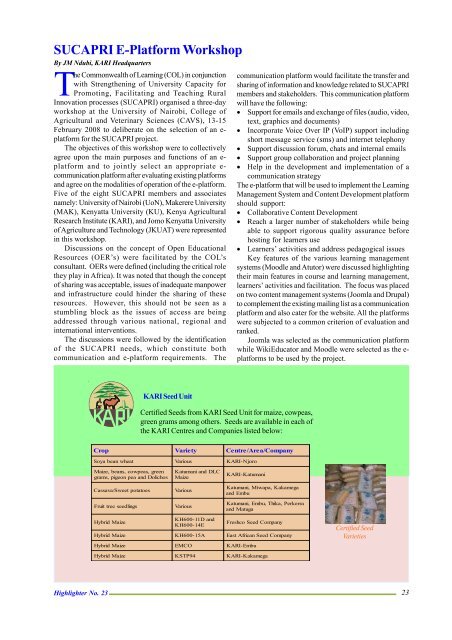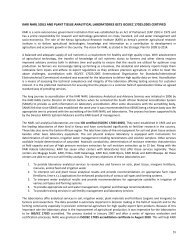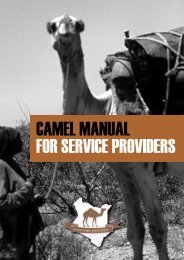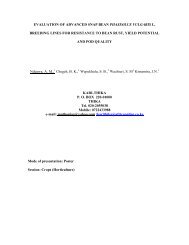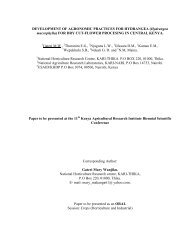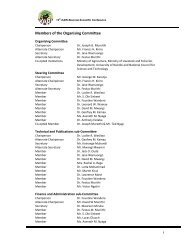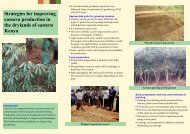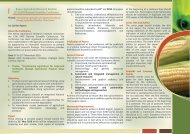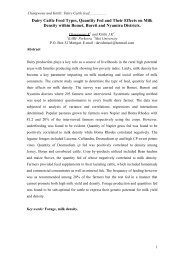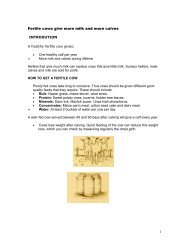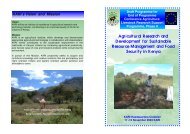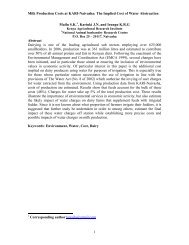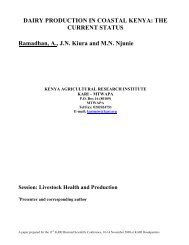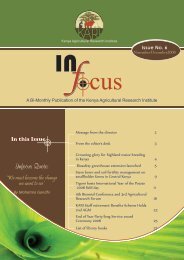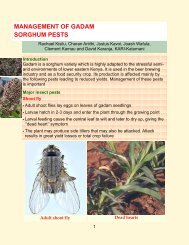January - June 2008 - Kenya Agricultural Research Institute
January - June 2008 - Kenya Agricultural Research Institute
January - June 2008 - Kenya Agricultural Research Institute
Create successful ePaper yourself
Turn your PDF publications into a flip-book with our unique Google optimized e-Paper software.
SUCAPRI E-Platform Workshop<br />
By JM Ndubi, KARI Headquarters<br />
The Commonwealth of Learning (COL) in conjunction<br />
with Strengthening of University Capacity for<br />
Promoting, Facilitating and Teaching Rural<br />
Innovation processes (SUCAPRI) organised a three-day<br />
workshop at the University of Nairobi, College of<br />
<strong>Agricultural</strong> and Veterinary Sciences (CAVS), 13-15<br />
February <strong>2008</strong> to deliberate on the selection of an e-<br />
platform for the SUCAPRI project.<br />
The objectives of this workshop were to collectively<br />
agree upon the main purposes and functions of an e-<br />
platform and to jointly select an appropriate e-<br />
communication platform after evaluating existing platforms<br />
and agree on the modalities of operation of the e-platform.<br />
Five of the eight SUCAPRI members and associates<br />
namely: University of Nairobi (UoN), Makerere University<br />
(MAK), <strong>Kenya</strong>tta University (KU), <strong>Kenya</strong> <strong>Agricultural</strong><br />
<strong>Research</strong> <strong>Institute</strong> (KARI), and Jomo <strong>Kenya</strong>tta University<br />
of Agriculture and Technology (JKUAT) were represented<br />
in this workshop.<br />
Discussions on the concept of Open Educational<br />
Resources (OER’s) were facilitated by the COL’s<br />
consultant. OERs were defined (including the critical role<br />
they play in Africa). It was noted that though the concept<br />
of sharing was acceptable, issues of inadequate manpower<br />
and infrastructure could hinder the sharing of these<br />
resources. However, this should not be seen as a<br />
stumbling block as the issues of access are being<br />
addressed through various national, regional and<br />
international interventions.<br />
The discussions were followed by the identification<br />
of the SUCAPRI needs, which constitute both<br />
communication and e-platform requirements. The<br />
communication platform would facilitate the transfer and<br />
sharing of information and knowledge related to SUCAPRI<br />
members and stakeholders. This communication platform<br />
will have the following:<br />
• Support for emails and exchange of files (audio, video,<br />
text, graphics and documents)<br />
• Incorporate Voice Over IP (VoIP) support including<br />
short message service (sms) and internet telephony<br />
• Support discussion forum, chats and internal emails<br />
• Support group collaboration and project planning<br />
• Help in the development and implementation of a<br />
communication strategy<br />
The e-platform that will be used to implement the Learning<br />
Management System and Content Development platform<br />
should support:<br />
• Collaborative Content Development<br />
• Reach a larger number of stakeholders while being<br />
able to support rigorous quality assurance before<br />
hosting for learners use<br />
• Learners’ activities and address pedagogical issues<br />
Key features of the various learning management<br />
systems (Moodle and Atutor) were discussed highlighting<br />
their main features in course and learning management,<br />
learners’ activities and facilitation. The focus was placed<br />
on two content management systems (Joomla and Drupal)<br />
to complement the existing mailing list as a communication<br />
platform and also cater for the website. All the platforms<br />
were subjected to a common criterion of evaluation and<br />
ranked.<br />
Joomla was selected as the communication platform<br />
while WikiEducator and Moodle were selected as the e-<br />
platforms to be used by the project.<br />
KARI Seed Unit<br />
Certified Seeds from KARI Seed Unit for maize, cowpeas,<br />
green grams among others. Seeds are available in each of<br />
the KARI Centres and Companies listed below:<br />
Crop<br />
Variet<br />
y<br />
Centre/Area/Compan y<br />
Soya<br />
bean wheat<br />
Variou<br />
s<br />
KARI-Njoro<br />
Maize, beans, cowpeas, green<br />
grams, pigeon pea and Dolichos<br />
Katumani and DLC<br />
Maize<br />
KARI-Katumani<br />
Cassava/Sweet<br />
potatoes<br />
Variou s<br />
Katumani, Mtwapa, Kakamega<br />
and Embu<br />
Fruit<br />
tree seedlings<br />
Variou s<br />
Katumani, Embu,<br />
and Matuga<br />
Thika, Perkerra<br />
Hybrid Maize<br />
Hybrid<br />
Maize<br />
KH600-11D and<br />
KH600-14E<br />
KH600-15A<br />
Freshco Seed Company<br />
East African Seed Company<br />
Certified Seed<br />
Varieties<br />
Hybrid<br />
Maize<br />
EMCO<br />
KARI-Emb u<br />
Hybrid<br />
Maize<br />
KSTP94<br />
KARI-Kakameg a<br />
Highlighter No. 23<br />
23


